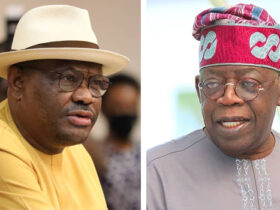
Nigeria, once hailed as Africa’s economic powerhouse, has tumbled from its top spot to fourth place in the continent’s economic ranking, according to forecasts from the International Monetary Fund (IMF). Under the leadership of Chief Bola Tinubu, who assumed office as the country’s chief in May 2023, significant policy reforms have been announced to address economic challenges.
The IMF’s projections paint a sobering picture of Nigeria’s economic trajectory. With a GDP estimated at $253 billion for the current year, Nigeria lags behind Algeria, Egypt, and South Africa. This represents a significant downturn from its previous position as Africa’s largest economy in 2022.
The decline can be attributed to several factors, including high inflation and currency devaluations. Chief Tinubu’s administration has taken steps to tackle these issues, including allowing the currency to float more freely and scrapping costly energy and gasoline subsidies. Despite these efforts, the Nigerian naira remains significantly weaker against the US dollar, with a 50% depreciation since Tinubu took office.
Similarly, Egypt, once a contender for the top spot in Africa’s economic landscape, has also experienced setbacks. The Egyptian pound has plummeted in value against the dollar following the government’s decision to allow the currency to float. This move was intended to attract investment but has resulted in a nearly 40% depreciation of the pound.
In contrast, South Africa’s economy is on the rise, poised to claim the title of Africa’s largest economy in 2024. The South African rand has maintained its value against the dollar, and the country is implementing measures to improve its energy supply and tackle logistical challenges.
READ ALSO: NAPTIP Arrests Fake Rev. Sister for Allegedly Trafficking 38 Children
Meanwhile, Algeria, buoyed by high oil and gas prices, has seen its economy benefit from global geopolitical tensions. As an OPEC+ member, Algeria has played a role in easing Europe’s energy concerns amid supply disruptions.
Despite these shifts in Africa’s economic landscape, Nigeria is projected to remain in fourth place for the foreseeable future. Chief Tinubu’s administration will need to continue implementing reforms to address the country’s economic challenges and regain its former status as Africa’s leading economy.









Leave a Reply